Bass Artistry: An Interview with Michael Manring
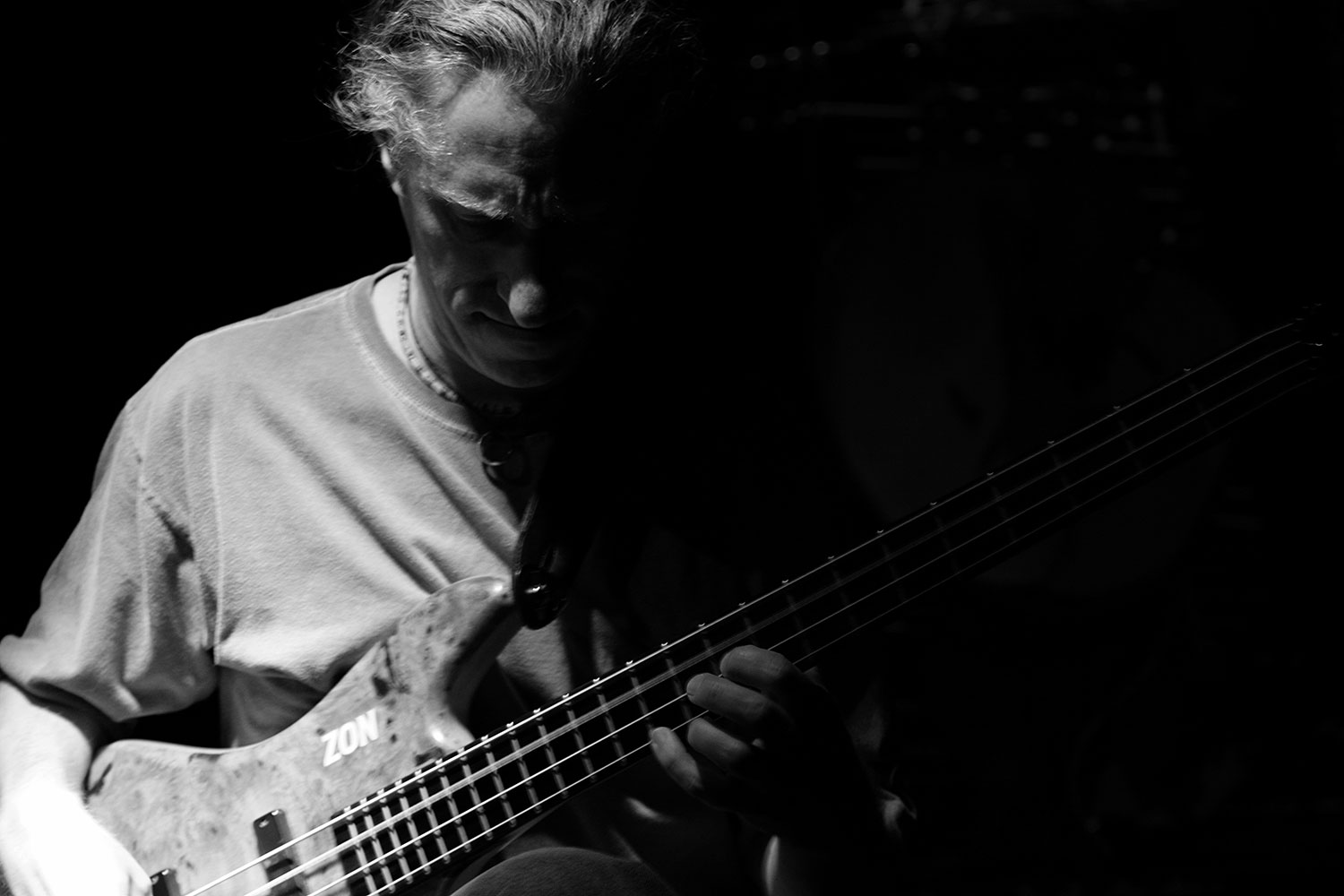
The art of solo bass has been steadily growing for the past couple of decades, but one bassist has always been a leading figure in the field. That bassist is Michael Manring.
It’s not just his use of extended techniques, his unusual tunings, or his unique gear that sets him apart. Manring consistently presents a level of artistry that touches people, no matter what their musical background happens to be. His songs range from soul-searching, dreamy, ambient ballads to bubbly funk tunes, and they all carry emotion that accesses the listener’s psyche.
Of course, Manring isn’t relegated to solo playing. He began playing with his brother at a young age and started his career playing with several bands including Natural Bridge. During the ’80s, he was house bassist for Windham Hill Records and recorded with a host of artists. It’s also where he released his first solo albums, which have been out of print for many years.
It was also in the ’80s when Manring met and studied with the legendary Jaco Pastorius. The experience was eye-opening for Manring in many ways, as the period he took lessons from Jaco was also the time when the bassist’s physical and mental health were in decline.
Manring is currently playing bass events and house concerts around the world in addition to recording. He has a new solo album in the works to follow up on 2005’s Soliloquy, which he recorded entirely without overdubs as a pure representation of his musicianship.
We got in touch with Manring to learn more about his upcoming album, his time with Jaco, the state of his early works, and how he keeps his creative juices flowing.
I understand you’re in the process of completing a new album. What can you tell us about it, and what inspired you to create a new album almost nine years after Soliloquy?
Soliloquy has been a successful release for me and I’ve been wanting to do another recording similar to it for some time, but I work slowly – especially on solo music. I’ve been involved in so many other projects lately it’s really been hard to find time to work on it, but I do have a lot of new music. I’m working on some new concepts as well as refinements of ideas I’ve been developing for a long time.
When can we expect it to be released?
I’m not certain about a release date. As I envision it now, the composing is done and a few of the tunes are recorded, so it’s just a matter of practicing – a lot of practicing! – and recording the rest of the tunes. Things could change, though.
What’s your writing process like?
I don’t have a single method of composing. A lot of pieces start to form while I’m playing bass, some come while I’m playing other instruments, some just come in my head. A lot of compositions work themselves out slowly through a painstaking process of collecting ideas, refining them, listening, re-working them and trying to make the best decisions at each step. Others arrive fully formed. Some tunes seem to need to be nothing more than general concepts to explore without over-thinking them. Often what ends up working is a combination of approaches.
It’s a hard thing to describe, perhaps because I’m so close to it, but if there’s any over-arching directive I use in composition it’s to allow the ideas to follow their own inherent logic. Sometimes the process is mostly intellectual, sometimes more emotional or intuitive, but usually a lot of all these things. Music is a fantastically deep art form and I hope to bring as much of myself to it as possible.
Are there any plans to reissue your Windham Hill records or Thonk?
There are no plans for re-releases at the moment. Those master tapes are owned by Sony and in spite of many rounds of negotiations, they still seem reluctant to make them available. With corporations of that size, it’s difficult to understand their motivations and I’ve never received a definitive answer as to why they want to hold on to that stuff without making it available. Personally I don’t mind so much because that music is in the past for me and I’m always thinking more about the future, but it would be nice if they were available for folks who’d like to listen to them, and of course, I could certainly use the little bit of income they might generate!
Who are some current musicians who inspire you?
The real answer to that question is that I’m inspired by anyone who brings himself or herself fully to the music-making process, whether it’s at Carnegie Hall or the blues joint at the corner, but I suspect that might not be the most satisfying response! So I’ll mention a few folks who may not be that well known: Terry Riley, Morton Feldman, Gyogy Ligeti, Henry Kaiser, Pete Zeldman, Mysore Manjunath, Pandit Pran Nath, Paul McCandless, Dusan Bogdanovic, Francis Dhomont, Domenico Scarliatti, Ned Rothenberg, Trichy Sankaran, Carlo Rizzo, François Couperin, Hariprasad Chaurasia, Paul Galbraith…
Here’s a toughie: tell us your five favorite albums?
Ouch, that is a toughie! I’ve never been good at picking favorites in music. It’s just hard for me to think that way. It’s especially hard because, like a lot of folks these days, I tend not to listen to full albums so much as bits and pieces of things. I don’t think I can pick five favorite albums, but if I try to think of five albums I’ve listened to a lot over the years and have meant something to me I can come up with these, in no particular order:
- Egberto Gismonti, Alma
- Harry Partch, Delusion of the Fury
- L. Subramanium, Kalyani
- Paolo Angeli, Linee di Fuga
- Andras Schiff/Sandor Vegh, W.A. Mozart Piano Concerto K. 595
You spent some time around Jaco and got to take lessons with him during his later years. What kind of perspective did that give you into him as a person? What were his lessons like?
It was both wonderful and difficult to get to know Jaco. When I studied with him in the early eighties he was my idol, so having the chance to spend time with him and learn about how he worked was a real gift. It was difficult because he was so terribly ill. I’m not sure I’ve ever met anyone else quite so self-destructive, and that set up an odd dynamic because I wanted to be him and he didn’t seem to want to be!
Although he actually liked teaching, he had no real method or curriculum and many of his students came away frustrated. Fortunately, I had about a million questions and he was always kind and patient in trying to answer them. He was also very supportive and kept telling me I was a “badass” and such, I think perhaps because he sensed I was struggling with self-confidence.
In the end, getting to know him personally had a bigger impact on me than the musical part of things. I had studied his music a lot on my own before I ever sat down with him and there weren’t a lot of big revelations in terms of musical structure, technique and method from our time together. But something about seeing who he was and how that related to the music he made helped send me on a more personal path that has really felt like home to me.
While your music can be extremely technically difficult, it always comes off as musical. How do you develop that musicality?
Thank you! As I mentioned, I’m fascinated with how deep and complete an experience music can be. When everything is working I find I’m bringing my whole being to the process—mentally, physically, emotionally—even spiritually, if you like to think that way. I enjoy music that just focuses on just technique or emotion or intellect, but for me the most powerful experience is when everything comes together. That’s what I reach for.
How do you stay so creative?
Thank you again! Actually, I feel a little sheepish about creativity because in my perception I’ve done very little. Again, music is just so vast and the bass is such a powerful an elegant way to explore it that I always feel there’s so much more to do. I won’t live long enough to explore half of what I’d like to, but I’ll keep going as long as I can.
Can you give us a rundown of your gear? Particularly, any new gadgets you’re excited about?
My Zon basses are at the core of my approach. I’m incredibly fortunate to have had their collaboration and friendship all these years and I can’t say enough about how great they are. I’ve also used D’Addario strings for many, many years and they’re perfect for me. The Ebow is indispensable to me, too. I use Markbass amplifiers and it’s been a privilege to work with this company. I use different models for the various situations I find myself in and they’re all just fantastic. Their dedication to quality and innovation is very inspiring. I also use different effects depending on the situation I’m in and I like to think of electronics as an extension of the instrument. I’m a big fan of Intellitouch tuners and of course, Bartolini pickups. The piece of gear I’m most excited about these days is the SoftStep pedal controller by Keith McMillen. It’s incredibly powerful, rugged and very portable—perfect qualities for making music in the real world today!
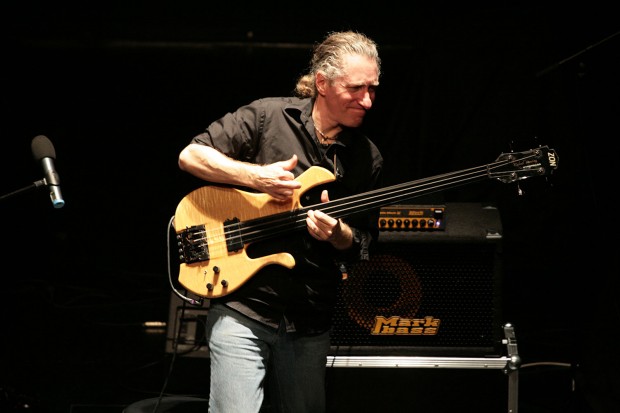
Do you have a practice routine?
Yes, I think so. I don’t get to practice as much as I’d like so I feel I have to be as efficient as possible. My first step is to be sure my goals are clear, then I try to focus on the kind of work that seems most likely to get me there. I have sets of exercises I’ve developed for myself over the years and that’s what I spend the bulk of my time on.
For more, visit manthing.com.

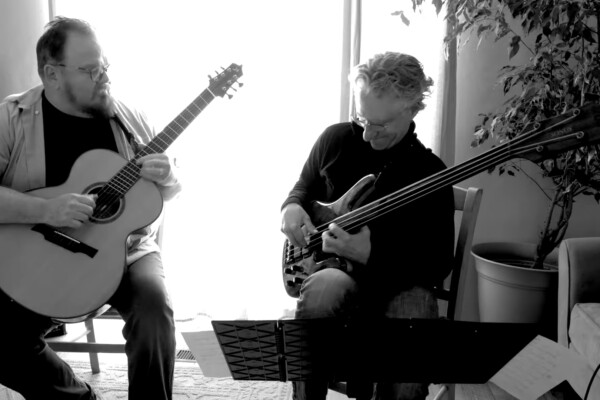
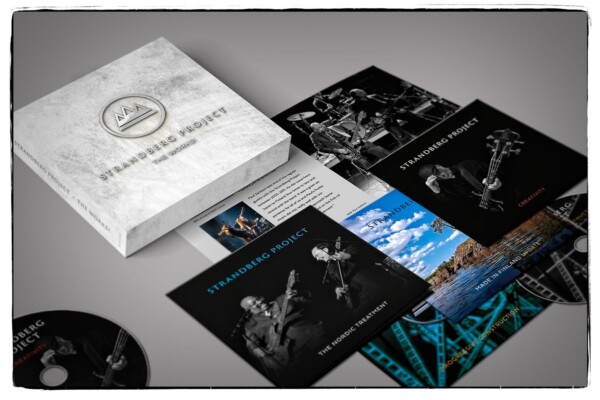
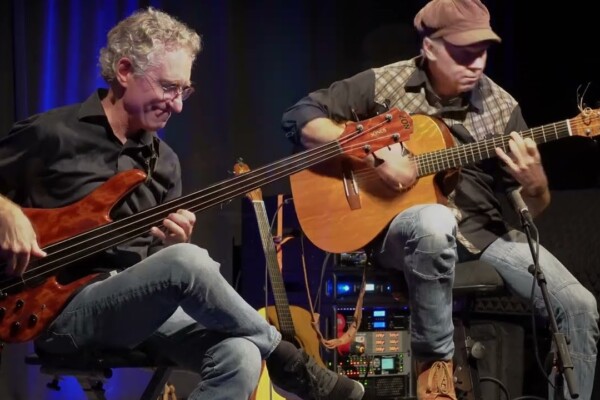
One of a kind. Amazing player and one of the sweetest guys you could ever meet! Great interview
would love to hear about parts of his practice regimen. I could use some help setting definite, concrete goals, and it seems like Manring has developed a good process for conceptualizing practice along those lines
master!!!!
For anybody interested, he also did a great Q&A session at Bass player live last year that’s available on youtube.
I had the pleasure of experiencing a live solo performance by Manring when I was at Berklee in 1987 or ’88. It was a master class of sorts, I had no idea who he was at the time but after that performance I went immediately back to my apartment, took my old Japanese p-bass copy beater and ripped the frets out! Watching and hearing him play Thunder Tactics and Longhair Mobile solo just blew my mind and completely changed how I looked at the electric bass. Been a fan ever since.
Complete Fan !!!
He’s just amazing! Really great interview!
Great interview, from an equally great bassist, musician and human being.
Goes to show that the best players are the most humble and down to earth. Bravo.
Michael Manring is, IMO, the only bassplayer I know off who can play original melodies / solo’s with such emotion that you can sense how he feels inside, very impressive. Examples to listen to: “When last we spoke” and “On a day of many angels”
A bassist who defies the boundaries and restrictive roles artificially assigned to the bass by less creative operators….and not surprisingly..a real good guy.